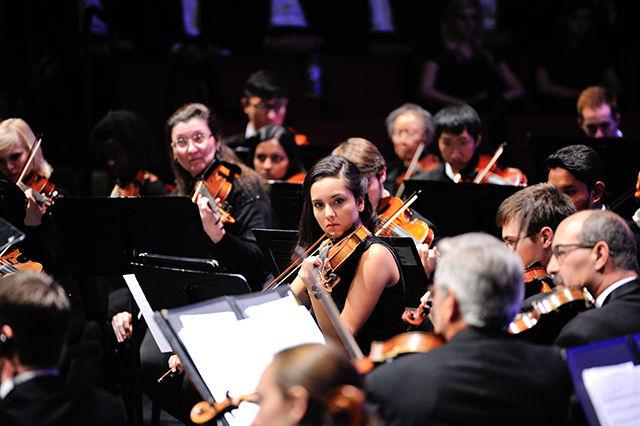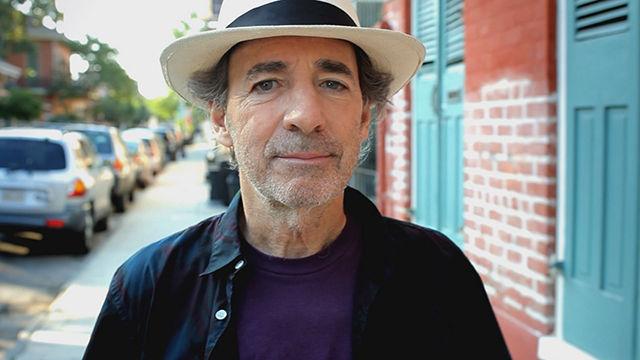The classic musical composition “Peter and the Wolf” will be presented April 24 in Stewart Theatre by the Raleigh Civic Chamber Orchestra and features special pieces by two members of NC State’s faculty and guest narrator Harry Shearer, who is the voice of 23 characters on “The Simpsons.”
“Peter and the Wolf” was written by composer Sergei Prokofiev in 1936, and its legacy has evolved, taking on different versions and modifications as well. There will be some modification for NC State, but the composition will remain true to the original work.
The Raleigh Civic Symphony and Raleigh Civic Chamber Orchestra is led by Peter Askim, the director of orchestral activities at NC State.
Askim said “Peter and the Wolf” is sometimes the first piece of music that people experience. The piece helps listeners become familiar with the instruments of the orchestra.
“For instance, there’s a cat in the story; the cat is played by the clarinet,” Askim said. “There’s a duck in the story; the duck is played by the oboe, so it’s a great way for kids to get to know the sounds of the orchestra and get to know classical music, but it’s also a really amazing piece for grown-ups too — it operates on all those different levels.”
A lot of people, especially musicians, know the music from past experience, but Askim said it’s a great experience to go through and rediscover it with everybody.
“The more that I look at it, the more I find, and I think that’s what a great piece of music will do,” Askim said. “You can hear it a million times, and you can study it a million times and there’s always something new.”
The program has three pieces including “Peter and the Wolf” with narration by Shearer, a solo cello piece performed by Jonathan Kramer and the world premiere of Rodney Waschka II’s “Raleigh Overture.”
Kramer is a professor of music and arts studies and has concertized extensively as a recitalist and chamber musician. Waschka is a CHASS professor and composer best known for his unusual operas and his algorithmic compositions.
The members of the orchestra are diverse in experience and background. In addition to students, who make up about half of the orchestra, there are members of the community who participate and perform, according to Askim.
While the composition involves fun and storytelling, it is more of a challenging piece that the orchestra will perform. Two of the pieces are unfamiliar since the Raleigh Overture has never been played before and Kramer’s solo piece is not very well-known, according to Askim.
“It’s an interesting process that we go through because we have to take those notes that are on the page, those black dots and figure out how to play those and sometimes that process is quite challenging because it’s very difficult rhythms or technically very fast or something,” Askim said. “So that’s kind of over the semester the process we’ve gone through — figuring out, practicing, translating that into sound and now we’re at the point of translating that sound into real emotion and communication.”
Kramer’s solo piece was written by Erno Dohnányi in the early 20th century in the style of the late romantics like Johannes Brahms and Richard Strauss, according to Kramer.
“It’s very lyrical and has nice melodies, rich harmonies and it’s a nice vehicle for both the soloist and the orchestra to kind of show off the different colors and the different expressive possibilities of this combination of cello and orchestra,” Kramer said.
The solo consists of three sections that go back and forth in an A, B, A manner from a quick tempo and opening melodies to an introspective and slow middle, then back again to the moderately fast speed with collaboration between Kramer and the cello section of the orchestra.
Kramer was the orchestra conductor from 1986 to 1996 and moved away from performances to lecture roles, so many of his students don’t know him as a performer.
This allows him to put on the other hat and show something else he does, according to Kramer.
When Askim got the new conducting job, Kramer asked him if the piece could be put on a program, allowing Kramer to play a piece he’s wanted to perform for over 50 years.
According to Waschka, Askim asked if he would write an opening piece for the concert referred to as a curtain raiser. Waschka will be hearing the Raleigh Overture for the first time when he listens to a rehearsal of it by the orchestra.
“As a composer you write the piece, and then often performers and conductors do not really want you around in the early rehearsals when they’re working out technical problems and that kind of thing, but later it can be useful to have the composer there to give some pointers on things,” Waschka said.
The orchestra members, faculty and narrator all come together in a classic performance with a special twist for NC State that brings the community together.
“Music is that thing beyond words that can touch us in those places that are so easy to lose touch with,” Askim said.
Harry Shearer will narrate Peter and the Wolf. In the past Shearer has voiced characters on the Simpsons, including Mr Burns and Ned Flanders.









